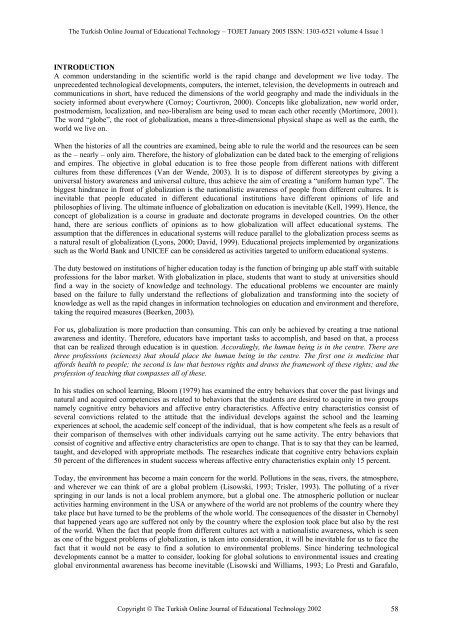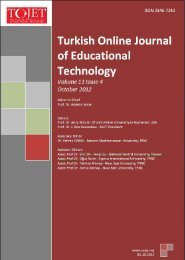Age - TOJET the Turkish online journal of educational technology
Age - TOJET the Turkish online journal of educational technology
Age - TOJET the Turkish online journal of educational technology
Create successful ePaper yourself
Turn your PDF publications into a flip-book with our unique Google optimized e-Paper software.
The <strong>Turkish</strong> Online Journal <strong>of</strong> Educational Technology – <strong>TOJET</strong> January 2005 ISSN: 1303-6521 volume 4 Issue 1<br />
INTRODUCTION<br />
A common understanding in <strong>the</strong> scientific world is <strong>the</strong> rapid change and development we live today. The<br />
unprecedented technological developments, computers, <strong>the</strong> internet, television, <strong>the</strong> developments in outreach and<br />
communications in short, have reduced <strong>the</strong> dimensions <strong>of</strong> <strong>the</strong> world geography and made <strong>the</strong> individuals in <strong>the</strong><br />
society informed about everywhere (Cornoy; Courtivron, 2000). Concepts like globalization, new world order,<br />
postmodernism, localization, and neo-liberalism are being used to mean each o<strong>the</strong>r recently (Mortimore, 2001).<br />
The word “globe”, <strong>the</strong> root <strong>of</strong> globalization, means a three-dimensional physical shape as well as <strong>the</strong> earth, <strong>the</strong><br />
world we live on.<br />
When <strong>the</strong> histories <strong>of</strong> all <strong>the</strong> countries are examined, being able to rule <strong>the</strong> world and <strong>the</strong> resources can be seen<br />
as <strong>the</strong> – nearly – only aim. Therefore, <strong>the</strong> history <strong>of</strong> globalization can be dated back to <strong>the</strong> emerging <strong>of</strong> religions<br />
and empires. The objective in global education is to free those people from different nations with different<br />
cultures from <strong>the</strong>se differences (Van der Wende, 2003). It is to dispose <strong>of</strong> different stereotypes by giving a<br />
universal history awareness and universal culture, thus achieve <strong>the</strong> aim <strong>of</strong> creating a “uniform human type”. The<br />
biggest hindrance in front <strong>of</strong> globalization is <strong>the</strong> nationalistic awareness <strong>of</strong> people from different cultures. It is<br />
inevitable that people educated in different <strong>educational</strong> institutions have different opinions <strong>of</strong> life and<br />
philosophies <strong>of</strong> living. The ultimate influence <strong>of</strong> globalization on education is inevitable (Kell, 1999). Hence, <strong>the</strong><br />
concept <strong>of</strong> globalization is a course in graduate and doctorate programs in developed countries. On <strong>the</strong> o<strong>the</strong>r<br />
hand, <strong>the</strong>re are serious conflicts <strong>of</strong> opinions as to how globalization will affect <strong>educational</strong> systems. The<br />
assumption that <strong>the</strong> differences in <strong>educational</strong> systems will reduce parallel to <strong>the</strong> globalization process seems as<br />
a natural result <strong>of</strong> globalization (Lyons, 2000; David, 1999). Educational projects implemented by organizations<br />
such as <strong>the</strong> World Bank and UNICEF can be considered as activities targeted to uniform <strong>educational</strong> systems.<br />
The duty bestowed on institutions <strong>of</strong> higher education today is <strong>the</strong> function <strong>of</strong> bringing up able staff with suitable<br />
pr<strong>of</strong>essions for <strong>the</strong> labor market. With globalization in place, students that want to study at universities should<br />
find a way in <strong>the</strong> society <strong>of</strong> knowledge and <strong>technology</strong>. The <strong>educational</strong> problems we encounter are mainly<br />
based on <strong>the</strong> failure to fully understand <strong>the</strong> reflections <strong>of</strong> globalization and transforming into <strong>the</strong> society <strong>of</strong><br />
knowledge as well as <strong>the</strong> rapid changes in information technologies on education and environment and <strong>the</strong>refore,<br />
taking <strong>the</strong> required measures (Beerken, 2003).<br />
For us, globalization is more production than consuming. This can only be achieved by creating a true national<br />
awareness and identity. Therefore, educators have important tasks to accomplish, and based on that, a process<br />
that can be realized through education is in question. Accordingly, <strong>the</strong> human being is in <strong>the</strong> centre. There are<br />
three pr<strong>of</strong>essions (sciences) that should place <strong>the</strong> human being in <strong>the</strong> centre. The first one is medicine that<br />
affords health to people; <strong>the</strong> second is law that bestows rights and draws <strong>the</strong> framework <strong>of</strong> <strong>the</strong>se rights; and <strong>the</strong><br />
pr<strong>of</strong>ession <strong>of</strong> teaching that compasses all <strong>of</strong> <strong>the</strong>se.<br />
In his studies on school learning, Bloom (1979) has examined <strong>the</strong> entry behaviors that cover <strong>the</strong> past livings and<br />
natural and acquired competencies as related to behaviors that <strong>the</strong> students are desired to acquire in two groups<br />
namely cognitive entry behaviors and affective entry characteristics. Affective entry characteristics consist <strong>of</strong><br />
several convictions related to <strong>the</strong> attitude that <strong>the</strong> individual develops against <strong>the</strong> school and <strong>the</strong> learning<br />
experiences at school, <strong>the</strong> academic self concept <strong>of</strong> <strong>the</strong> individual, that is how competent s/he feels as a result <strong>of</strong><br />
<strong>the</strong>ir comparison <strong>of</strong> <strong>the</strong>mselves with o<strong>the</strong>r individuals carrying out he same activity. The entry behaviors that<br />
consist <strong>of</strong> cognitive and affective entry characteristics are open to change. That is to say that <strong>the</strong>y can be learned,<br />
taught, and developed with appropriate methods. The researches indicate that cognitive entry behaviors explain<br />
50 percent <strong>of</strong> <strong>the</strong> differences in student success whereas affective entry characteristics explain only 15 percent.<br />
Today, <strong>the</strong> environment has become a main concern for <strong>the</strong> world. Pollutions in <strong>the</strong> seas, rivers, <strong>the</strong> atmosphere,<br />
and wherever we can think <strong>of</strong> are a global problem (Lisowski, 1993; Trisler, 1993). The polluting <strong>of</strong> a river<br />
springing in our lands is not a local problem anymore, but a global one. The atmospheric pollution or nuclear<br />
activities harming environment in <strong>the</strong> USA or anywhere <strong>of</strong> <strong>the</strong> world are not problems <strong>of</strong> <strong>the</strong> country where <strong>the</strong>y<br />
take place but have turned to be <strong>the</strong> problems <strong>of</strong> <strong>the</strong> whole world. The consequences <strong>of</strong> <strong>the</strong> disaster in Chernobyl<br />
that happened years ago are suffered not only by <strong>the</strong> country where <strong>the</strong> explosion took place but also by <strong>the</strong> rest<br />
<strong>of</strong> <strong>the</strong> world. When <strong>the</strong> fact that people from different cultures act with a nationalistic awareness, which is seen<br />
as one <strong>of</strong> <strong>the</strong> biggest problems <strong>of</strong> globalization, is taken into consideration, it will be inevitable for us to face <strong>the</strong><br />
fact that it would not be easy to find a solution to environmental problems. Since hindering technological<br />
developments cannot be a matter to consider, looking for global solutions to environmental issues and creating<br />
global environmental awareness has become inevitable (Lisowski and Williams, 1993; Lo Presti and Garafalo,<br />
Copyright © The <strong>Turkish</strong> Online Journal <strong>of</strong> Educational Technology 2002 58
















